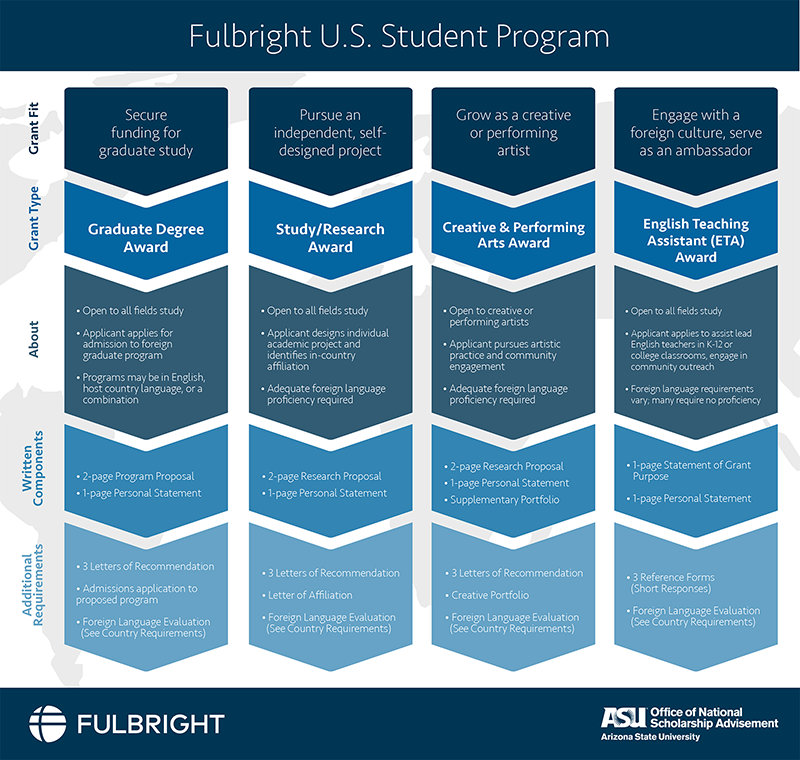A strong application for the Fulbright US Student Program takes significant time to complete - don’t wait to get started! Most successful Fulbright applicants write at least seven drafts of their application essays over a period of several weeks or months.
The ASU deadline to apply for the Fulbright US Student Program is Tuesday, September 9, 2025, 11:59 pm (AZ time).
Currently enrolled students are expected to apply through the campus process. The application is submitted entirely online. Students and alumni applying through the ASU campus process should follow these steps in the order described. Direct any questions or concerns about these instructions to [email protected].
Fulbright sounds interesting! What should I do before making my first appointment with ONSA?
- First, check your eligibility for the Fulbright US Student Program. Eligible applicants…
- Must be US Citizens;
- Can be a rising undergraduate senior (graduating Dec 2025 or May 2026), an enrolled graduate student (masters and PhD), or a recent ASU graduate; and
- Cannot yet hold a conferred PhD degree at the time of application (although it may be conferred before the start of the award year)
- Next, watch the Getting Started Series video, which outlines the Fulbright application timeline, eligibility requirements, grant types, and campus process.
- Then, begin determining which type of award interests you (the Getting Started video will discuss the options). The award type you choose will inform the country to which you apply - not all award types are available in all countries, and many countries offer unique awards.
There are four main types of awards:- English Teaching Assistant (ETA) Award
- Research Award
- Creative and Performing Arts Award
- Graduate Degree Award
- Lastly, make a list of countries that you would like to consider for your Fulbright host country. You are welcome to list as many as you like at this stage - we will help you narrow down your choices later. Just remember that, ultimately, you can only choose ONE award type and ONE country per application cycle.
OK, I watched the Getting Started Series, confirmed my eligibility, and made a list of potential award types and countries! What is my first step in the ASU Fulbright process?
- You should schedule a Fulbright intake meeting according to the award type that interests you. You will see these three options on our scheduling site:
- Fulbright English Teaching Assistant (ETA) Intake
- Fulbright Research and Arts Intake
- Fulbright Graduate Degree Award Intake
- If you aren’t sure which type of award you want to pursue, just pick one that you are considering. You can do as many different intake meetings as you need!
- Intake meetings are exploratory. We will discuss the application timeline, how the specific award could build on your skills and support your goals, walk through the Fulbright website, and strategize next steps. Intake meetings will occur over ZOOM and in a small group setting with an ONSA advisor.
- Following your intake meeting, you may open a Fulbright application.
Step 2: I completed an intake! What is the second step in the ASU Fulbright process?
At this point, you should begin preparing to write your application essays.
- Before you schedule the next appointment, however, you are required to watch our application walkthrough video.
- Then, you can schedule a 'Getting Ready to Write' meeting via our scheduling site. The "GRTW" meetings occur over ZOOM and in a small group setting with an ONSA advisor.
- Before you meet, you should have selected an award type and narrowed down your potential country options. In the meeting, we will explore your motivations for applying to Fulbright, discuss strategies for the application essays, and begin generating ideas. By the end of this meeting, you will have a clear idea of your award-specific requirements and country preferences, and have the basis for your first essay drafts.
- Following this meeting, you should open an online Fulbright application, if you haven't already done so.
Step 3: I’ve completed an Intake and Getting Ready to Write meeting. Now what?
At this point, you are ready to start drafting your materials and may have additional questions related to your application.
- You can visit “The Write Place,” ONSA’s drop-in hours for writing support, to begin brainstorming your application materials with an advisor.
- Once you have started on a draft and are ready for review, you should schedule a Draft Review meeting for your specific award type. Draft review meetings are offered in both small-group workshop and one-on-one formats. During these meetings, you will also have the opportunity to discuss other application components as a group and strategize productive writing habits.
- You are encouraged to work on your application materials often, and schedule multiple meetings as you revise your essays. ONSA is open all summer, so take advantage of the office and start chipping away at your essays!
Step 5: I’ve been working on my application materials! When do I need to submit?
All ASU applicants must 'lock' their online Fulbright application for campus review by Tuesday, September 9, 2025. Please note that this date is much earlier than the submission deadline listed on the Fulbright website. All ASU applicants must plan to have a complete application by this date. (You will have the opportunity to return to your application and make changes after your campus interview, so do not panic!)


